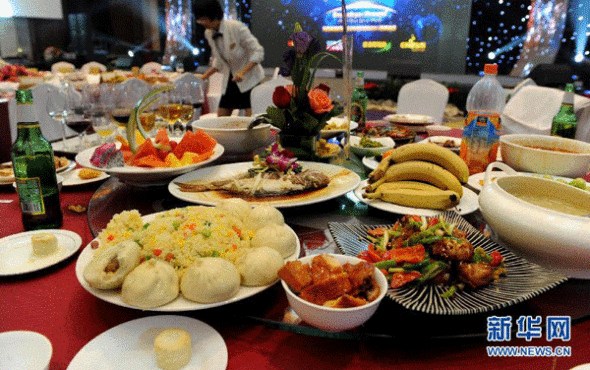
(Photo/Xinhua)
In early 2013, a nationwide campaign to eliminate food waste swept across China. The movement, called "empty plate," quickly began to change the way people thought about leftovers in a nation where ordering more than you can eat is considered a status symbol.
Posters in support of a more frugal lifestyle sprang up in streets, restaurants and cafeterias across the country. Hundreds of thousands of restaurants answered the call by offering smaller dishes, abolishing minimum fees and encouraging customers to take their leftovers home. Posting pictures of finished dishes even became a social media trend, and the term "empty plate" appeared on a list of the top 10 buzzwords from 2013.
As the far-reaching campaign against corruption was also in full swing, the movement had special implications for government officials, who were asked to steer clear of lavish banquets, one of the biggest sources of food waste.
Observers have acknowledged a growing appreciation and reverence for food in the past few years, thanks to the campaign. However, many think the campaign has lost steam in the four years since its launch, and that food waste is still a rampant issue in China.
The current amount of garbage coming from urban kitchens is a clear sign that food waste is staging an unwelcome comeback. According to a Tianjin waste management company, kitchen garbage dropped significantly in the first year of the campaign. Afterward, however, the trend gradually reverted.
In 2013, 15 restaurants in central China's city of Wuhan reached a high-profile agreement to downsize their portions, but none of the businesses stuck to that promise in the long run, resulting in an astonishing amount of unfinished food going directly into the trash, according to a recent report by Xinhua.
The China Consumers' Association asked restaurants to abolish minimum fees in early 2013. The move was lauded by consumers, who complained that in the past they were often forced to order more food than they could eat, or else risk getting stuck with an extra service fee. Unfortunately, most of China's high-end restaurants still uphold that policy today.
The annual waste of grain in China is estimated to be around 18 million tons, enough to feed up to 50 million people for one year. A commentary published by the People's Daily on May 27 called on the public to renew the campaign, arguing that concrete action is key and everyone must do his or her part to cut down on food waste.


















































